Ever wanted to share The Dispatch with your friends and family? You’re in luck! To celebrate our five year anniversary, we’re giving our members five free guest passes. Click here to generate your promo codes and send them to folks you think would like our style.
We’re grateful to you, dear member, for helping to fuel our growth these past five years. We literally could not do what we do without the support of our paying members. By sharing The Dispatch, you’re an integral part of our future success.
Happy Friday! Election Day is 25 days away. David and Mike are in Allentown, which is nothing like what Billy Joel described more than 40 years ago.
Up to Speed
- In lieu of a second debate, CNN proposed town halls with former President Donald Trump and Vice President Kamala Harris. Trump has yet to comment on the invitation, but Harris has accepted it. The network plans to host the town halls on October 23 in Pennsylvania before a live audience of persuadable voters. Both CNN and Fox News offered to host a second debate between the two candidates, but Trump on Wednesday said he would not participate in another debate before Election Day.
- Trump also said in a Thursday address at the Detroit Economic Club that he would seek to make interest rates on car loans fully tax-deductible. “This will stimulate massive domestic auto production and make car ownership dramatically more affordable for millions and millions of working American families,” the former president added. He has recently proposed eliminating taxes on tips, income from overtime work, and Social Security.
- Former President Bill Clinton will campaign for Harris in battleground states, beginning with stops next week in Georgia before touring North Carolina by bus, CNN reported Thursday. Clinton will avoid large rallies and speak mostly at smaller events with a focus on the economy, and he will particularly target counties that Trump won in 2020. Clinton is not the only former Democratic president to campaign for Harris in the election’s final stretch, as Barack Obama held a rally for her in Pittsburgh on Thursday.
- Some House Democrats would not commit to certifying a Trump win in November, Axios reported Thursday. House Committee on Oversight and Accountability ranking member Rep. Jamie Raskin of Maryland—who objected to making Trump’s win official in 2016—said the group “would obviously accept it” if the former president “won a free, fair and honest election.” But does he assume a Trump win would be free, fair, and honest? “I definitely don’t assume that,” Raskin told Axios. The comments come as Republicans have refused to say whether President Joe Biden won in 2020.
- A number of House Republicans condemned comments made by Rep. Marjorie Taylor Greene, who said last week that “they can control the weather” and that it is “ridiculous for anyone to lie and say it can't be done” in the aftermath of Hurricane Helene, Axios reported Thursday. “Humans cannot create or control hurricanes,” Florida Rep. Carlos Gimenez said in reply to her X post. “Anyone who thinks they can, needs to have their head examined.” Axios also quoted an anonymous GOP member who called Greene’s comments “looney toons” and said there was widespread disapproval of her rhetoric in the caucus.
Harris’ Canvassers in Pennsylvania Sprint to the Finish
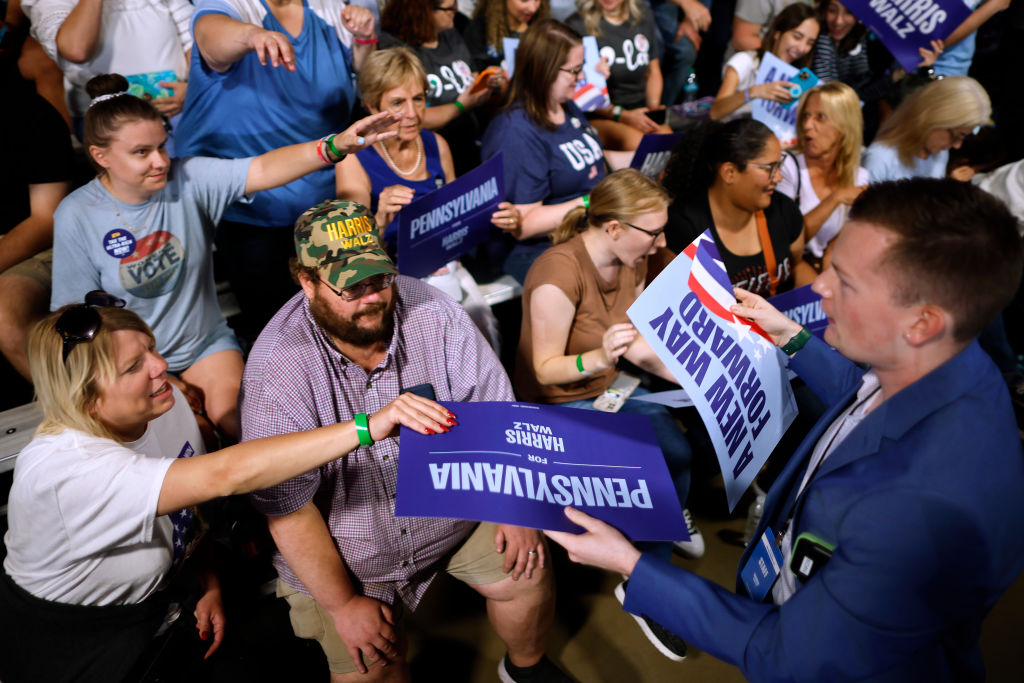
EASTON, Pennsylvania—Nancy Bellers and Angelo DeRaymond live a block away from each other in this city’s South Side neighborhood, but their views on the presidential race are miles apart.
Bellers, 62, is voting for Kamala Harris, she excitedly told a Democratic canvasser knocking on doors early Thursday evening. She is a committed Democrat who says she votes in every election and can’t wait to vote in person on November 5 for the vice president. “I think she’s doing an amazing job,” Bellers told Dispatch Politics. “Unfortunately she’s fighting against all the lies that they’re spreading.”
The 32-year-old DeRaymond, on the other hand, is voting for Donald Trump for the third consecutive election, a fact the lifelong, registered Republican sheepishly mentioned after listening patiently to the canvasser’s pitch for the Democratic nominee. “I never liked his tweets, all that,” he later told Dispatch Politics, of the former president. “I never liked any of that stuff, but at the end of the day, what he said on Twitter wasn’t what he was actually doing. I liked what he was actually doing.”
The canvasser is Matt Munsey, who also happens to be chairman of the Democratic committee here in Northampton County. As is often the case in campaigns, Munsey is focusing on homes where Harris’ team believes gettable voters reside. (This working-class neighborhood just south of the Lehigh River went for President Joe Biden over Trump in 2020 by a 2-to-1 margin.) The majority of those Munsey spoke to along West Lincoln Street Thursday said they were supporting Harris; several plan to vote on Election Day.
But a few, like DeRaymond, made it clear they weren’t interested. Munsey, operating out of an expansive local field office, brushed it off. “There’s always people we’re maybe not going to be able to reach. And so that’s why we run, we sprint through the finish line,” he said.
Northampton County may be the best case study for understanding where Pennsylvania, and likely the country, is ultimately leaning. In 2020 Biden won this corner of the Lehigh Valley by the narrowest margin—less than 1 point or roughly 1,200 votes—of any Pennsylvania county. But four years earlier, Trump won it by more than 3 percentage points on his way to winning the state. The split Dispatch Politics witnessed in Easton’s South Side illustrates perhaps the key truism of the 2024 election: Pennsylvania remains the ultimate battleground state because it’s so evenly and unpredictably divided.
Blue-collar voters whose parents were reliable Democrats might be regular Republicans now. Suburbanites with Republican tendencies might be turned off by Trump’s braggadocio and pull the lever for the Democrats. Minorities not used to voting for Republicans are weighing the last four years of economic struggles and reconsidering whether they want to give Harris another four years in power. As the parties shift their focus in the final weeks of the race from persuasion to getting out the vote, it can be difficult for even the most attuned observers to be entirely sure how it will all shake out.
“Cautious optimism” is how Tony Iannelli, president of the Greater Lehigh Valley Chamber of Commerce and longtime resident of the region, described the mood of the local Republicans he talks to during a conversation with Dispatch Politics at the well-appointed Lehigh Country Club. And the Democrats? “I think they’re just focused on the finish line,” he said.
The Lehigh Valley region, for which Allentown is the economic and cultural hub, is a representative slice of Pennsylvania with its mix of urban, suburban, and rural communities.
The area has long shed its reputation as a Rust Belt outpost after the demise of Bethlehem Steel. Less than two hours from both Philadelphia and New York, the Lehigh Valley now enjoys a more diversified economy and reasonable cost of living. The growth of the past two decades has brought in plenty of newcomers to the region, and a majority of residents in Allentown are Hispanic. And despite the positive effects of this relative boom, inflation and a housing shortage remain nagging problems.
Typical of the new Lehigh Valley is Daniel Campo, a 28-year-old cargo airline pilot and Venezuelan immigrant who is voting in his first presidential election since becoming a U.S. citizen in 2022.
Through a whirlwind series of events as he got involved in local Republican politics, Campo found himself onstage with Trump at a rally in Wilkes-Barre back in August, warning voters of the dangers of socialism. He’s now an active volunteer for the Trump campaign in Northampton County, specifically targeting his fellow Hispanic voters. Campo told Dispatch Politics he finds the best message to get these voters on board with Trump is primarily about the economy.
“They were thinking … that yes, it was way better off under Trump—economically, financially, there was no new wars,” Campo said. “The U.S. was pretty much in a good situation, and they feel that way.”
The Third-Party Electoral Landscape
The ballot-status battles for third-party candidates in next month’s presidential election appear to have wound down, giving us a working picture of how longshot presidential hopefuls could affect the final result.
The place to start is by looking at which of this election’s seven swing states—Wisconsin, Michigan, Pennsylvania, North Carolina, Georgia, Arizona, and Nevada—will include third-party candidates as options for their voters. Democrat-turned-independent-turned-Trump-supporter Robert F. Kennedy Jr., despite his best efforts, is on the ballot in Michigan and Wisconsin. Left-wing academic Cornel West has achieved access in Michigan, Wisconsin, and North Carolina. Meanwhile, the Green Party’s Jill Stein is on the ballot in all the battlegrounds except Nevada. And Libertarian Party nominee Chase Oliver is on the ballot in every swing state.
None of these candidates will receive a large number of votes. But they could siphon off enough votes from Vice President Kamala Harris and former President Donald Trump to swing pivotal states and, thus, the election.
West and Stein, the two progressives on some states’ ballots, pose the greatest threat to the vice president, according to Rob Stutzman, a California-based campaign consultant. “Stein becomes, I think, probably the largest concern, just given her past performance, but where West and Stein can collectively siphon even 2 percent of the vote has to be a real concern to Harris,” he told Dispatch Politics.
Stein has a history of making things difficult for Democrats in battleground states. In 2016, then-Secretary of State Hillary Clinton lost Michigan and its 16 Electoral College votes to Trump by about 10,700 votes, while Stein picked up more than 51,000.
This year, some progressive voters in the Wolverine State may already have reason enough to withhold their vote from Harris: her support for Israel. Warning signs for Democrats on that front appeared earlier this year when more than 100,000 voters, or 13 percent of the electorate, in the party’s Michigan primary selected “uncommitted” to protest President Joe Biden’s handling of the Jewish state’s military operations in the Gaza Strip. The Uncommitted National Movement announced last month that it would not endorse Harris, though one of its co-founders said at the time that he would vote for Harris and another encouraged Democrats to “register anti-Trump votes.” What’s more, the movement posted a video all but saying that a Trump administration would be worse for Palestinians.
Whether because of Israel’s war or not, Democrats have long been worried about a third-party candidate playing spoiler for their nominee. “In a state like ours, in a state like Pennsylvania, you don’t need significant support to throw an election to Donald Trump,” Michigan Senate Minority Whip Mallory McMorrow said in late March on a Democratic National Committee press call.
Ironically, McMorrow said that in response to Kennedy’s selection of his former running mate, Nicole Shanahan, when the Democratic Party was actively opposing his campaign. Kennedy endorsed Trump in August and subsequently attempted to remove his name from the ballots where his presence would help Harris.
Kennedy has been explicitly discouraging voters from selecting him in the states where he’ll still be on the ballot. Some will likely do so but “probably not in consequential numbers,” Stutzman said. Still, that 5,000 or 10,000 votes that would otherwise go to Trump could make a difference. Plus, anti-vaxxers could be drawn to Kennedy, whom Stutzman called a “thought leader” in the movement.
Libertarian nominee Chase Oliver is also on the ballot in all the battleground states, and Stutzman said he warrants concern from Trump in states like Arizona where Kennedy is not on the ballot. However, “Oliver has zero name ID,” according to Stutzman, making him different from the Libertarians’ 2016 nominee, former New Mexico Gov. Gary Johnson. In addition to his relatively low profile, Oliver won the divided party’s nomination after six rounds of voting at the May convention.
Stutzman said Oliver is “probably in about the same range” as the 2020 Libertarian candidate, Jo Jorgensen. Though she was less known than Johnson, she received more votes than Biden’s margin of victory in multiple battleground states.
So, what should the Harris and Trump campaigns do to hedge against potential third-party spoilers?
Stutzman advised Harris not to talk about West and Stein. “Don’t raise their profile at all,” he said. “There’s things you can do at a granular level to be careful that you’re not turning those voters out with your [get out the vote] efforts.”
He gave similar advice to Trump in dealing with Oliver. “Trump’s campaign just needs to take care to not turn out Oliver voters,” he said. “The most efficient ground operations have done the work to ID specific voters so as to not turn out voters who will vote against you. There’s some question as to how well the Trump field campaign has been able to do that.”
As for Trump with Kennedy, Stutzman said that if the campaign had data indicating Kennedy was hurting Trump, the team should send Kennedy out to states where he’s on the ballot to stump for him.
Kennedy joined Trump at a rally in Michigan late last month. “My name is going to appear on the Michigan ballot, but I don’t want you to vote for me,” he said. “I want you to vote for Donald J. Trump.”
Eyes on the Trail
- Former President Donald Trump today will deliver remarks in Aurora, Colorado—about which he has made exaggerated claims about the presence of Venezuelan gangs—before holding a rally in Reno, Nevada. He will host rallies in Coachella, California, on Saturday and Prescott Valley, Arizona, on Sunday.
- Vice President Kamala Harris today will host a campaign rally in Scottsdale, Arizona. On Sunday, she will rally with voters in Greenville, North Carolina.
- Sen. J.D. Vance of Ohio will speak in Johnstown, Pennsylvania, Saturday. The Republican vice presidential nominee will hold a town hall in Reading, Pennsylvania, the same day.
- Minnesota Gov. Tim Walz, the Democratic vice presidential nominee, will deliver remarks in Macomb County, Michigan, today.
- Second gentleman Doug Emhoff will campaign in suburban Philadelphia Sunday, speaking at a “Girl Dads for Harris-Walz” and state Democratic Party phone bank kickoff in Delaware County, Pennsylvania. He will then speak at a “Get Out the Jewish Vote” event in neighboring Montgomery County.
- First lady Jill Biden will campaign for Harris in Yuma, Arizona, today, in Phoenix on Saturday, and in northern Nevada on Sunday.
- The Trump campaign’s North Carolina bus tour finishes today, as former Department of Defense Chief of Staff Kash Patel, former acting Secretary of Homeland Security Chad Wolf, and former California Lt. Gov. Abel Maldonado will campaign in the state for the former president.
Notable and Quotable
“Part of it makes me think that, well, you just aren’t feeling the idea of having a woman as president, and you’re coming up with other alternatives and reasons for that.”
—Former President Barack Obama speaking to black men in Pennsylvania, October 10, 2024



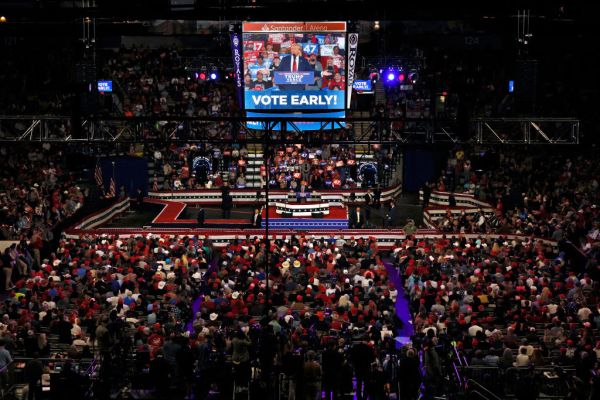
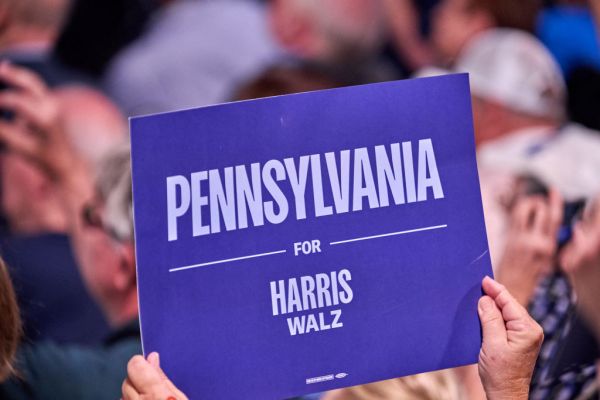
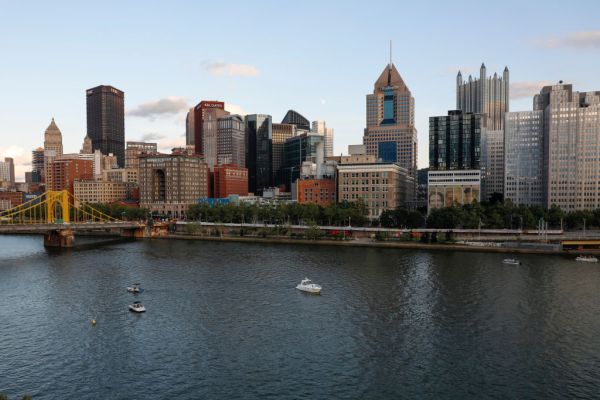

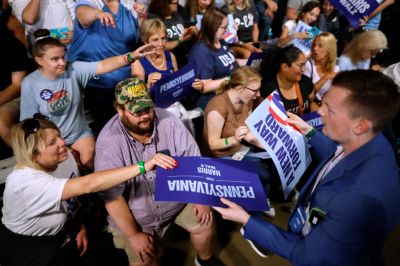
Please note that we at The Dispatch hold ourselves, our work, and our commenters to a higher standard than other places on the internet. We welcome comments that foster genuine debate or discussion—including comments critical of us or our work—but responses that include ad hominem attacks on fellow Dispatch members or are intended to stoke fear and anger may be moderated.
With your membership, you only have the ability to comment on The Morning Dispatch articles. Consider upgrading to join the conversation everywhere.